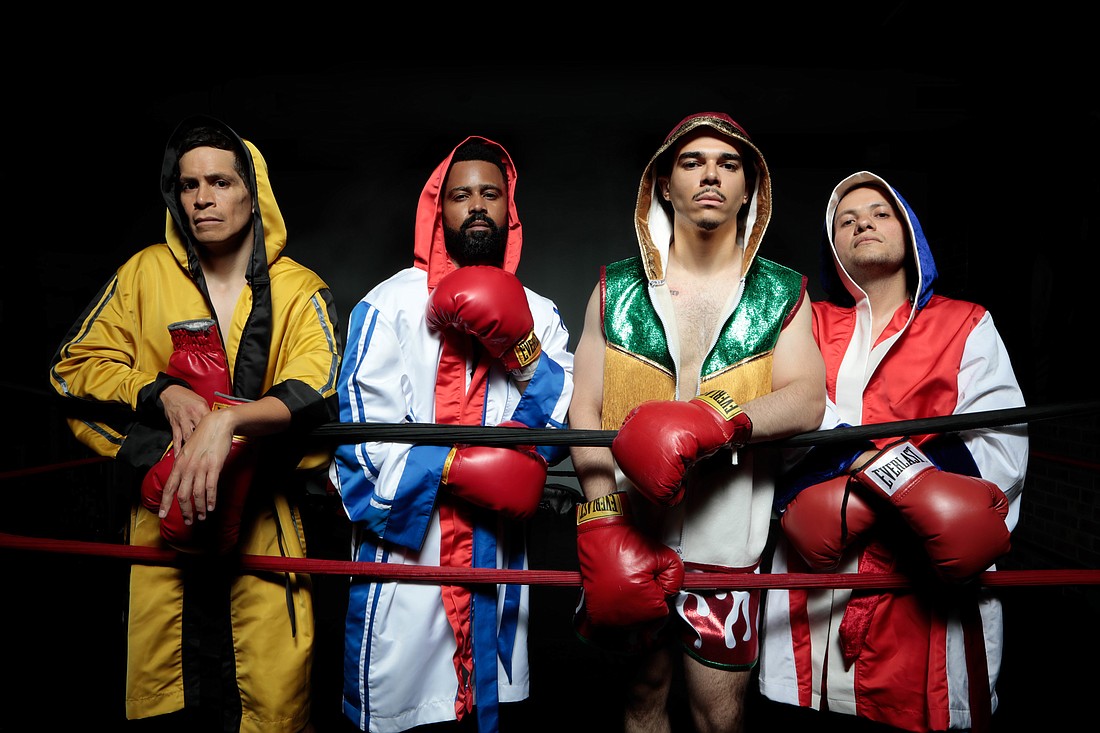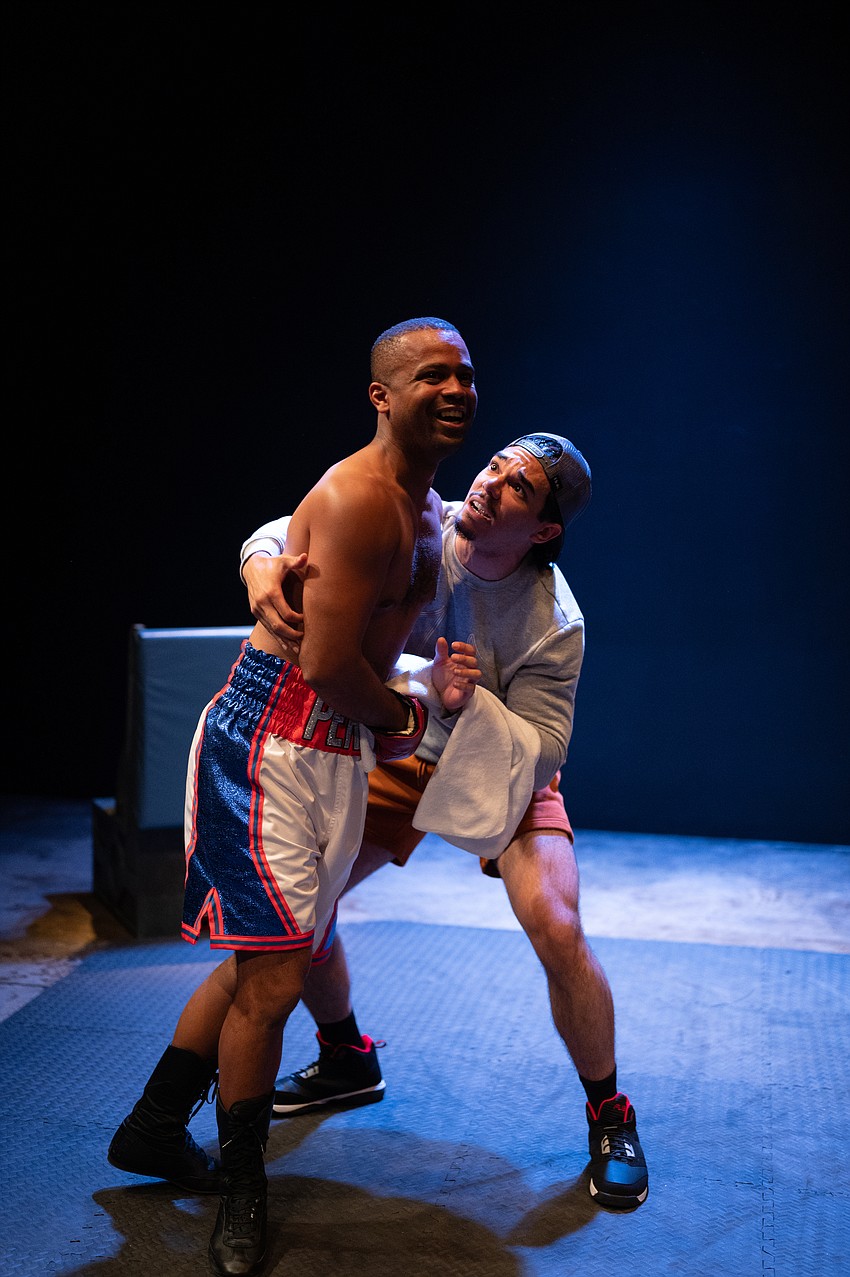- May 4, 2024
-
-
Loading

Loading

Franky D. Gonzalez’s “That Must Be the Entrance to Heaven” just premiered at Urbanite Theatre. The play revolves around a quest for the title of World Heavyweight Boxing Champion.
Fisticuffs aside, this isn’t your typical boxing play. It flips genre expectations. “Rocky” it isn’t. It’s more of an anti-boxing play. We’ll explain why later. For now, let’s talk about what it is.
There are four contenders vying for the heavyweight title. All happen to be Latino. All have paid a heavy price to be in the competition.
Armando (Edgar Miguel Sanchez) defected from Cuba to make the boxing big time. His father considers him a traitor to the revolutionary cause. Was it worth it? Armando’s starting to doubt it. He’s discovered that boxers don’t age as well as wine.
Edgar (Peter Pasco) emigrated from Mexico as a child and blames himself for his mother’s death on the journey to America. He hopes that winning the title will earn him an “extraordinary ability” visa. (In the ring, Juan gives himself the visa’s name — “Extraordinary EB-1”)
Juan (Juan Ramirez Jr.) hates the sport of boxing. But it's the only thing he knows, and he keeps it up to support his family. Manuel (Rodney Nelson) is living in his champion brother’s shadow — and carries the weight of his sibling’s suicide after a powerhouse punch turned off his opponent’s lights. Permanently.
The story builds from there, but I won’t spoil it. Let’s just say it’s far from basic.
Kathleen Capdesuner’s direction makes the most of Gonzalez’s shattered structure. In boxing, keeping an opponent off-balance is a tried-and-true technique. You feint, get the opponent to lunge, make them lose their center of gravity. That’s what the text demands. That’s what Capdesuner does.
Tom Hansen’s set isn’t a realistic boxing ring; it’s more like a boxing ring turned inside-out. (An accurate re-creation would make it hard for the actors to move around on stage.) Caroline Eng’s sound design and Ethan Vail’s lighting smartly evoke the playwright’s half worlds. The black hole is a key motif in this play. Vail brings it to life without elbowing you in the ribs.

The actors make me forget that they’re actors. This doesn’t feel like looking at a performance. It feels like I’m looking at different people. I don’t mean it as a compliment. It’s just a fact.
Diego Villada’s fight choreography is brilliant. It’s possible to fake contact — championship wrestling proves it. But Villada takes a different approach. He shows you the movement patterns without impact. But this is boxing, not ballet. The fight direction conveys the brutal, visceral violence of the sport. The actors’ moves feel real. (And so does their sense of pain and physical damage.)
You can tell that Villada’s fiercely trained them. Beyond accuracy, their punches, blocks and dodges are characterization. The boxers’ moves tell you who they are. (That’s baked into Gonzalez's script — and he has a keen grasp of boxing’s in-the-moment strategy.) Villada gets it. And makes sure you get it.
Gonzalez's work is a higher level of difficulty. The playwright has a long list of bravura techniques. Mundane realism isn’t one of them. Gonzalez’s speech is heightened. His dialogue feels like poetry — and sometimes feels like a contrapuntal fugue.

His well-drawn characters don’t sound like each other. His boxers often talk to people who aren’t there — ghosts, memories. It’s soliloquy in disguise. These X-rays of the soul remind me of Chayefsky at his best. Or Shakespeare. Technique aside, Gonzalez’s implied philosophy sets his work apart. Yes, you heard right. “Philosophy.”
“That Must Be the Entrance to Heaven” is a philosophical play with boxing gloves.
Its philosophy is why it flips genre expectations.
Boxing plays (and movies like “Rocky”) typically get you rooting for one boxer to follow their dreams and win. Even if they lose, they’re still a winner. It’s a feel-good genre, with some notable exceptions like "Raging Bull."
“Entrance to Heaven” is more of an anti-boxing play. (Anti-genre, not anti-sport. Just to be clear.)
Gonzalez makes you root for all four contenders. Then he makes you question their dreams of boxing glory. And all dreams, for that matter.
"...The weight of a Dream suffocates the soul," says the boxer Armando. The price the pugilists pay — just to be contenders — doesn’t seem worth it. Winning the title doesn’t magically solve anyone's problems. There are no winners. Even if you lose, you win.
“Boxing” is clearly a metaphor for the human condition on this Earth. Life is a struggle. If you’re a Latino on the outside looking in, the struggle is harder. There are winners and losers. Your choices determine which one you are. Time is a one-way street. There’s no going back.
Gonzalez contrasts that with another metaphor. A special kind of black hole (i.e., heaven’s entrance) that Juan’s mother told him about when he was a kid. Within its singularity, life isn’t a struggle. Here, every possible choice happens simultaneously. There is no time. And no need to go back.
And that’s just the short version.
This play has a lot going for it. Sometimes it feels like too much. And that’s my only beef. I sometimes lose the metaphysical thread in all its various complications — and keeping the thread is what I’m good at.
Gonzalez needs to play a game of creative Jenga and take out some of the philosophical meandering without making the narrative structure collapse. That’s a surface criticism. A matter of style, not the heart.
“That Must Be the Entrance to Heaven” has miles and miles of heart.
It’s not afraid to break your heart.